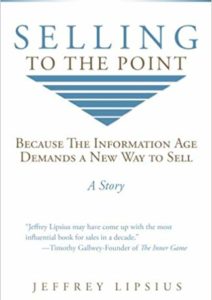Back in my cold-calling days, a Health Food Store owner whom I solicited agreed to buy one trial bottle of the multi-vitamin I was selling. I placed a follow up call with him a month later to see how the trial went. He responded, “Yes, that was the best multiple I’ve seen. Please ship me another bottle.” I replied, “If you think it’s so great, why are you buying just one?” He replied, “Oh, it’s not for my vitamin store. I want it to give to my family.” Utterly confused, I asked him if he could elaborate. He answered, “You were right, it’s a great multi and my family’s appreciative that you introduced it to me. I just wouldn’t be able to get my customers to buy something costing over $10.”
At that moment it dawned on me that I successfully established rapport, but it was the wrong rapport. The retailer trusted me, but didn’t trust himself. He lacked confidence in his ability to persuade customers to pay a little more for something healthier. His lack of self-rapport trumped all the rapport between him and me.
This realization threw a lot of what I learned from traditional sales training out the window. Sales trainers emphasized establishing rapport between the salesperson and the customer. I never heard a sales trainer talk about establishing customer self-rapport. Yet I was discovering that customer self-rapport was the more important of the two. I could successfully built rapport with a customer, but if that customer lacked self-rapport, then buying wouldn’t happen. I can also recall occasions when I lacked good rapport with a customer, but the customer bought anyway. The customer’s self-rapport was strong enough to outweigh the lack of rapport between the customer and me.
I continued to notice more instances where lack of customer self-rapport posed significant obstacles to buying. Often, a customer said something like, “This is a bigger decision than I can make on my own.” Or, “I don’t think my business will be successful enough to afford that.” I would recognize such statements as coming from the customer’s lack of self-rapport.
These days I’ve come to the realization that customer self-rapport is one of the biggest factors affecting decision-making. Low customer self-rapport is disastrous for making good buying-decisions. Its significance is underestimated because salespeople don’t see it. It happens silently inside the customer’s head.
It becomes salespeople’s challenge, then, to prioritize supporting customers to strengthen their self-rapport. Customers may display a tough veneer to salespeople. In reality, they can feel self-doubts and insecurities just like salespeople can. Customers’ insecure thoughts and feelings are detrimental to their self-rapport.
Traditional sales training underestimates the importance of customer self-rapport. In actuality, it’s one of the most important factors to affect your customer’s decision-making.
Pipeliner CRM empowers salespeople to establish the right rapport with customers.Get your free trial of Pipeliner CRM now.











Comments